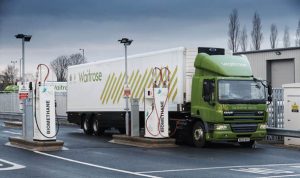The Anaerobic Digestion and Bioresources Association, also known as ABDA, has made calls for the UK government to put biomethane at the centre of its plans for the future of LGVs and buses. As part of its Clean Air Strategy, the Government should be looking at fuelling large vehicles with cleaner biomethane in order to reduce pollution. ABDA is a UK trade body which champions the cleaner biomethane as a potential fuel source of the future, helping us to cut emissions in line with the levels needed for a reduction in greenhouse gasses.
The lower rate of pollution is caused by the anaerobic digestion of the organic waste, which produces a gas that can eventually be used as fuel for all kinds of vehicles, even larger ones like trucks and buses. ABDA argue that the UK is already in a position to power the whole country’s buses this way, meaning all public transport on the road could be switched right now if needed. This has already started to happen. For example, in Nottingham there is an entire fleet of biogas-powered double-decker buses. The fleet cost £17 million and is the world’s largest team of biogas vehicles so far.
Recently, the Government’s Department for Environment, Food and Rural Affairs announced it was planning a nitrogen dioxide compliance move which would be implemented in all towns and cities in the country. That means local councils would need to take measures to reduce the nitrogen dioxide in the air, and tackling the emissions from public transport vehicles would be a big part of that.

In order to help these authorities to make the changes, a fund of £225 million is available to be shared among them. Meanwhile, a Clean Air Fund is also available for many relevant things including updating bus fleets to run on more environmentally friendly fuels. Biomethane production in the UK increased by 100% in 2016, showing a rapid growth in the area, and giving hope that more and more cities will follow Nottingham’s lead.
LGVs will also be addressed in the new Government plans, with a trade-off meaning that drivers can driver heavier vehicles if they choose electric or gas powered models instead of diesel or petrol. The latest news in carbon emission initiatives is the diesel scrappage scheme, a plan currently in talks to take all diesel vehicles off the UK’s roads by 2040. Although LGVs would be exempt from this scheme if it goes ahead (in the beginning at least), it’s appealing to haulage companies and drivers to be able to operate heavier vehicles, which they would be allowed to do. To know more about the biomethane HGV’s please download the PDF.
Heavier loads will always appeal to LGV companies because they can transport more goods at once, meaning they’re better value for their clients and can boast greater flexibility. Market competition would therefore be the greatest tool in making HGVs greener.
Just fill in your details below and we’ll send you a free theory test practice with.
Just let us know your score...
We reserve the right to contact you in the
future via this email
By Signing up, you agree to our Terms & Privacy Policy
By Signing up, you agree to our Terms & Privacy Policy
By Signing up, you agree to our Terms & Privacy Policy
By Signing up, you agree to our Terms & Privacy Policy
By Signing up, you agree to our Terms & Privacy Policy